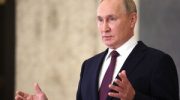Kyiv will find itself in a difficult situation in which many forces in the world will turn around and start forcing it to accept Russian peace on unacceptable terms.

While Russia is stepping up its offensive in eastern Ukraine, in the West, Vladimir Putin began to assume that he had ordered his army to succeed in Mariupol before celebrating Victory Day on May 9. Such considerations are based largely on indirect evidence and the cult status of Victory Day. But what Moscow is saying to its people cannot confirm this. After all, domestic propaganda no longer promises a quick end to the war.
However, Putin can declare victory any day he wants, – writes in the pages of The Guardian expert of the program on Russia and Eurasia at Chatham House Cyrus Hills. He points out that Russia has already changed the goals of its war. And she can do it again if she needs to. Moscow can say that it has fulfilled its tasks regardless of the facts on the ground and announce the end of the so-called “special operation” whenever it wants. And this will put Ukraine in front of another difficult dilemma. It will have to continue the battle when Russia allegedly offers peace, risking losing support in the West, which would prefer an end to the fighting, even if it means the end of Ukraine in the long run.
Read also: The war could end in direct talks between the Presidents of the Russian Federation and Ukraine – Podoliak
Russia's unilateral declaration of an end to the war will force Western partners to put pressure on Kyiv to accept the offer. And it is possible that President Volodymyr Zelensky will not be able to resist for long. These partners will also reduce their financial support needed to continue Ukrainian military operations if they decide that continuing the war is “optional.” Until May 9 or not, there are many reasons for Russia to seek a temporary truce. At least in order to regroup their exhausted troops. The proclamation of victory will give Russia a “way out” that will be really useful for Moscow, unlike all the options proposed by Western leaders at the beginning of the year, when they tried to prevent the beginning of fighting in general.
Instead of seeking to deplete Ukraine's defense at any cost, Russia's offensive could pursue limited and more focused ambitions. The author believes that the “inevitable cessation of resistance” in Mariupol can be described as a “great strategic victory.” Russia and its propaganda, continuing to call the Azov Battalion “neo-Nazis,” could announce the successful completion of Ukraine's “denazification.” The Kremlin controls almost all the information that most of the Russian population receives. Therefore, even insignificant territorial gains can be inflated to a great breakthrough.
Ukraine cannot continue the war indefinitely without great economic support and increased military assistance. Its infrastructure is under attack. Key exports are blocked by the Russian fleet. And the population suffers from injuries inflicted by the Russian occupation. If the Western allies do not provide the necessary support, Ukraine may feel that the burden of war is too great. Unfortunately, Russia is able and willing to sacrifice more resources and people to the war. At the same time, Ukraine is well aware that Moscow will not conclude peace agreements with good intentions. And the end of the conflict will not alleviate the suffering of Ukrainians who remained in the occupation. Ukraine has a moral imperative to help its citizens who have faced terror and deportation in the Russian-occupied territories.
If Zelensky accepts peace, Ukraine will not be able to thwart Russia's plans for the occupied regions. The Kremlin is already preparing fake “referendums” on the seized pieces of Ukrainian land, repeating the practice of 2014. Together, the West and Ukraine will rebuild destroyed Ukrainian cities, the Ukrainian economy, and strengthen the army. But Russia will still be able to resume the war when it feels a good time has come. Of course, a “temporary” truce risks dividing the country into a Russian-occupied part and a main Ukraine. The low-intensity conflict may also continue, which Russia will be able to escalate as soon as it wants.
Read also: In Russia, the production of SAM has stopped, factory workers are sent on vacation or to war
A longer period of high-intensity war will do even more damage to Ukraine. But this is also a bigger risk for Russia. Its military commanders are now well aware of the nature of the war, as well as the strength of Ukraine's resistance. This may force them to take a more cautious approach. Russia has been training its army for decades, spending very large budgets on it. And now this army has suffered catastrophic losses in the first stage of the war against Ukraine. Therefore, Russian generals will try to maintain as many combat capabilities as possible for the next phase of the war against the West.
Putin has other deadlines. Russia is going to hold presidential elections in March 2024. Putin says he has not yet “decided” whether to run again. But he needs Russian society to view the invasion of Ukraine as a success, no matter how fraudulent the election. And this is also a reason for Russia to seek an end to the war against Ukraine after the proclamation of “victory”.
A small territorial gain in Ukraine other than Mariupol will give Russian propagandists good material. If Putin convinces himself that his invasion of Ukraine has fully or partially achieved its goals, and that losses among the Russian military have been acceptable, then his next wars will begin sooner rather than later.
See special topic: Martial law in Ukraine: what are the rights and responsibilities of citizens The most important thing about martial law Parliament adopted as a basis a bill on changes in local government martial law The document, in particular, expands the powers of the head of the community and regulates the activities of district and regional military administrations. Russia continues to deploy battalion tactical groups in Ukraine – Pentagon Most of them are sent to Donbas. ZN.UA project “Moms” will be shown at the Venice Biennale The project became part of the exhibition dedicated to Ukraine's struggle for its freedom. For the first time since the Russian invasion, Israel will supply bulletproof vests and helmets to Ukraine – media Israel is currently studying the technical side of the issue – ways to deliver protective kits and the mechanism of their transfer appointment.


